Fred Morgan joined the army as a Boy in 1933 aged 15. He enlisted at Gravesend into the 2nd Battalion Bedfordshire and Hertfordshire Regiment. After initial training Fred was allocated to the band as a bandboy. Quite happy with this Fred began learning to play the drums and was so short at that time that the decorative cords hanging from beneath the drum had to be removed to avoid him tripping up on them. He eventually became part of the band formally and took up the role of percussionist. Training was provided and he became skilled in the various percussion instruments particularly tuned percussion which included the xylophone. In 1939 at the outbreak of war, the War Department decided that military bands were not of value and most were disbanded.
Fred now found himself being retrained on the Boys Anti-tank rifle. Named after a Captain Boys of the Royal Engineers. It was quite a change but given that all soldiers were given basic infantry training at the time the transition, although not what he had planned was fairly straightforward. Fred liked to tell the story of how, when he joined, part of the infantry training was how to "Form square, to repel natives".
After the conversion to anti-tank gunner Fred joined the rest of 2nd Battalion as part of the British Expeditionary Force sent to France in early 1940. After marching up to the Belgian border the news of French capitulation reached them and they immediately had to turn round and get to the French coast as quickly as possible. He and his colleagues arrived Dunkirk just as Operation Dynamo, the evacuation of British and French troops was underway. Fred was wounded by bomb fragments in the leg and under the chin. Having applied field dressing he made his way, having loss touch with his comrades, towards the Mole, a jetty where he saw troops lining up to be embarked onto larger vessels. He joined a queue of Guardsmen. The officer in charge saw that he was wounded and ordered "Come forward that man!" He was put in a boat with a sailor who rowed him out to one of the warships anchored off Dunkirk. Once on board he was told to go below. Not fancying his chances should anything go wrong he decided to remain on deck. Fortunately, the ship finally departed and Fred made it back to Dover. His injuries meant that he was sent to Horton Hospital. This was one of the so-called lunatic asylums in Epsom that had been commandeered by the Army for use as military hospitals. He recovered from his wounds and was eventually discharged as fit for duty. Meanwhile, the War Department had had a change of heart. The country was in its darkest period and stood alone and the War Department recognised that properly used military bands could help lift morale across both military and civilian society.
Fred was able to resume his position as percussionist/drummer in the band. He and the band gave many concerts both for fund raising and moral boosting purposes. During this latter period as the war was drawing to a close the Beds & Herts Bandmaster offered Fred the opportunity to train as a Bandmaster himself. Fred took thee opportunity and enrolled at the Royal Military School of Music which in peacetime had been at Kneller Hall near Twickenham. During the war it had relocated to Churchill House in North Camp, near Aldershot. The lack of opportunities following the war meant that Fred spent four years in training rather than the usual three. During this period the school returned to its home at Kneller Hall.
Eventually he was lucky enough to be appointed Bandmaster of the 1st Battalion, The Parachute Regiment in Aldershot in 1951. This meant that along with the RSM, the legendary Tom Duffy, he was a senior WO1. Surrounded by experienced parachutists he felt that regardless of his role, he, like them should earn his wings. He did his course at No.1 Parachute Training School, then at RAF Abingdon. Like all members of the regiment he was proud the wear the badge, having successfully completed the course. He maintained his jumping record throughout his time with the regiment.
He had not long been in his new role when the regiment was sent to the Canal Zone, and stationed in Moascar, Egypt. After three year they decamped to Cyprus. The band always played a key role in the regimental anniversaries such as Arnhem Day and of course the 1953 Coronation which was celebrated by the regiment in the Canal Zone.
Eventually, it was back to Aldershot. Here, the band continued to entertain both civilian and military audiences and be part of the key regimental activities of the time. Notable amongst these was the granting of the Freedom of Aldershot. The band of the 1st Battalion led the regiment through Aldershot, flags flying and bayonets fixed.
After ten years in the Paras, Fred was offered the most prestigious role a Bandmaster can aspire to; the School Bandmaster at the Royal Military School of Music at Kneller Hall. This is the most senior Bandmaster in the British Army. While reluctant to leave the Parachute Regiment where clearly he had many friends, this represented a real opportunity to broaden both his skills and coach the Bandmasters of tomorrow.
His six years tenure at Kneller Hall concluded when he was commissioned with the rank of Captain and seconded from the British Army to be Director of Music for the Royal Brunei Malay Regiment. After four years in Brunei, he finally retired in 1971.
Fred Morgan died of Mesothelioma in 2002.






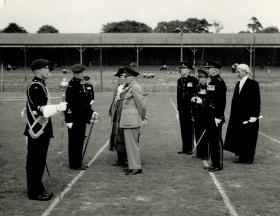
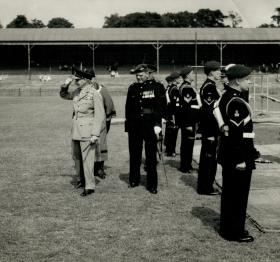
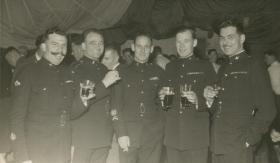
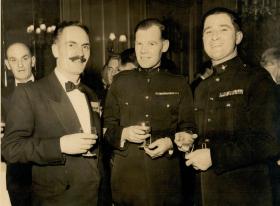
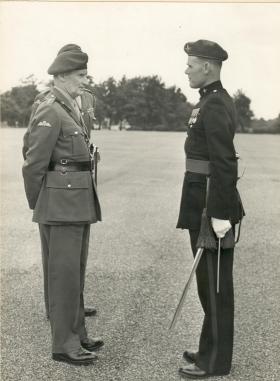
Latest Comments
There are currently no comments for this content.
Add Comment
In order to add comments you must be registered with ParaData.
If you are currently a ParaData member please login.
If you are not currently a ParaData member but wish to get involved please register.